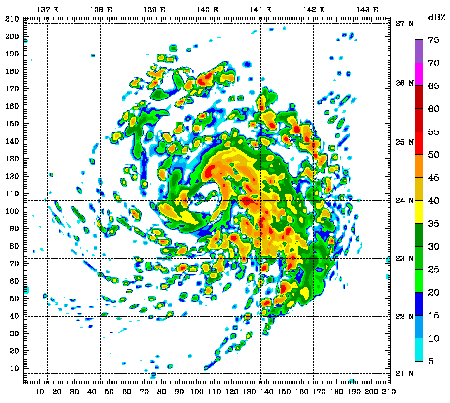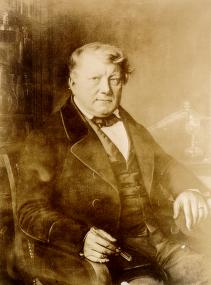|
Chemistry Transport Model
A chemical transport model (CTM) is a type of computer simulation, computer numerical model which typically simulates atmospheric chemistry and may give air pollution forecasting. Chemical transport models and general circulation models While related global climate model, general circulation models (GCMs) focus on simulating overall atmospheric dynamics (e.g. fluid flow, fluid and heat flows), a CTM instead focuses on the stocks and flows of one or more chemical species. Similarly, a CTM must solve only the continuity equation for its species of interest, a GCM must solve all the primitive equations for the atmosphere; but a CTM will be expected to accurately represent the entire biogeochemical cycle, cycle for the species of interest, including Flux#Transport phenomena, fluxes (e.g. advection), chemical production/loss, and Deposition (chemistry), deposition. That being said, the tendency, especially as the FLOPS#Cost of computing, cost of computing declines over time, is for GCM ... [...More Info...] [...Related Items...] OR: [Wikipedia] [Google] [Baidu] |
Computer Simulation
Computer simulation is the process of mathematical modelling, performed on a computer, which is designed to predict the behaviour of, or the outcome of, a real-world or physical system. The reliability of some mathematical models can be determined by comparing their results to the real-world outcomes they aim to predict. Computer simulations have become a useful tool for the mathematical modeling of many natural systems in physics (computational physics), astrophysics, climatology, chemistry, biology and manufacturing, as well as human systems in economics, psychology, social science, health care and engineering. Simulation of a system is represented as the running of the system's model. It can be used to explore and gain new insights into new technology and to estimate the performance of systems too complex for analytical solutions. Computer simulations are realized by running computer programs that can be either small, running almost instantly on small devices, or large ... [...More Info...] [...Related Items...] OR: [Wikipedia] [Google] [Baidu] |
Volatile Organic Compounds
Volatile organic compounds (VOCs) are organic compounds that have a high vapour pressure at room temperature Colloquially, "room temperature" is a range of air temperatures that most people prefer for indoor settings. It feels comfortable to a person when they are wearing typical indoor clothing. Human comfort can extend beyond this range depending on .... High vapor pressure correlates with a low boiling point, which relates to the number of the sample's molecules in the surrounding air, a trait known as volatility (chemistry), volatility. VOCs are responsible for the odor of scents and perfumes as well as pollutants. VOCs play an important role in communication between animals and plants, e.g. attractants for pollinators, protection from predation, and even inter-plant interactions. Some VOCs are dangerous to human health or cause harm to the natural environment, environment. Human impact on the environment, Anthropogenic VOCs are regulated by law, especially indoors, where c ... [...More Info...] [...Related Items...] OR: [Wikipedia] [Google] [Baidu] |
Tropospheric
The troposphere is the first and lowest layer of the atmosphere of the Earth, and contains 75% of the total mass of the planetary atmosphere, 99% of the total mass of water vapour and aerosols, and is where most weather phenomena occur. From the planetary surface of the Earth, the average height of the troposphere is in the tropics; in the middle latitudes; and in the high latitudes of the polar regions in winter; thus the average height of the troposphere is . The term ''troposphere'' derives from the Greek words ''tropos'' (rotating) and '' sphaira'' (sphere) indicating that rotational turbulence mixes the layers of air and so determines the structure and the phenomena of the troposphere. The rotational friction of the troposphere against the planetary surface affects the flow of the air, and so forms the planetary boundary layer (PBL) that varies in height from hundreds of meters up to . The measures of the PBL vary according to the latitude, the landform, and the tim ... [...More Info...] [...Related Items...] OR: [Wikipedia] [Google] [Baidu] |
Earth
Earth is the third planet from the Sun and the only astronomical object known to harbor life. While large volumes of water can be found throughout the Solar System, only Earth sustains liquid surface water. About 71% of Earth's surface is made up of the ocean, dwarfing Earth's polar ice, lakes, and rivers. The remaining 29% of Earth's surface is land, consisting of continents and islands. Earth's surface layer is formed of several slowly moving tectonic plates, which interact to produce mountain ranges, volcanoes, and earthquakes. Earth's liquid outer core generates the magnetic field that shapes the magnetosphere of the Earth, deflecting destructive solar winds. The atmosphere of the Earth consists mostly of nitrogen and oxygen. Greenhouse gases in the atmosphere like carbon dioxide (CO2) trap a part of the energy from the Sun close to the surface. Water vapor is widely present in the atmosphere and forms clouds that cover most of the planet. More solar e ... [...More Info...] [...Related Items...] OR: [Wikipedia] [Google] [Baidu] |
Concentrations
In chemistry, concentration is the abundance of a constituent divided by the total volume of a mixture. Several types of mathematical description can be distinguished: '' mass concentration'', ''molar concentration'', ''number concentration'', and ''volume concentration''. The concentration can refer to any kind of chemical mixture, but most frequently refers to solutes and solvents in solutions. The molar (amount) concentration has variants, such as normal concentration and osmotic concentration. Etymology The term concentration comes from the word concentrate, from the French , from con– + center, meaning “to put at the center”. Qualitative description Often in informal, non-technical language, concentration is described in a qualitative way, through the use of adjectives such as "dilute" for solutions of relatively low concentration and "concentrated" for solutions of relatively high concentration. To concentrate a solution, one must add more solute (for example, a ... [...More Info...] [...Related Items...] OR: [Wikipedia] [Google] [Baidu] |
Ozone
Ozone (), or trioxygen, is an inorganic molecule with the chemical formula . It is a pale blue gas with a distinctively pungent smell. It is an allotrope of oxygen that is much less stable than the diatomic allotrope , breaking down in the lower atmosphere to (dioxygen). Ozone is formed from dioxygen by the action of ultraviolet (UV) light and electrical discharges within the Earth's atmosphere. It is present in very low concentrations throughout the latter, with its highest concentration high in the ozone layer of the stratosphere, which absorbs most of the Sun's ultraviolet (UV) radiation. Ozone's odour is reminiscent of chlorine, and detectable by many people at concentrations of as little as in air. Ozone's O3 structure was determined in 1865. The molecule was later proven to have a bent structure and to be weakly diamagnetic. In standard conditions, ozone is a pale blue gas that condenses at cryogenic temperatures to a dark blue liquid and finally a violet-black soli ... [...More Info...] [...Related Items...] OR: [Wikipedia] [Google] [Baidu] |
Max Planck Institute For Meteorology
The Max Planck Institute for Meteorology (''Max-Planck-Institut fĂĽr Meteorologie''; MPI-M) is an internationally renowned institute for climate research. Its mission is to understand Earth's changing climate. Founded in 1975, it is affiliated with the Max Planck Society and the University of Hamburg, and is based in Hamburg's district of EimsbĂĽttel. Its founding director was the Nobel laureate Klaus Hasselmann. The current managing director is Bjorn Stevens. Organization and Research The MPI-M comprises two departments and hosts independent research groups. They also conduct work with national and international partners. Departments: * Atmosphere in the Earth System - investigates the weather and its affect on the climate * Ocean in the Earth System - investigates how the ocean plays a part in the planet's climate Independent research groups: * CLICCS joint working group * Minerva Fast Track Research Group * Climate Vegetation Dynamics * Environmental Modeling Cooperative ... [...More Info...] [...Related Items...] OR: [Wikipedia] [Google] [Baidu] |
Geophysical Fluid Dynamics Laboratory
The Geophysical Fluid Dynamics Laboratory (GFDL) is a laboratory in the National Oceanic and Atmospheric Administration (NOAA) Office of Oceanic and Atmospheric Research (OAR). The current director is Dr. Venkatachalam Ramaswamy. It is one of seven NOAA Research Laboratories (RLs). GFDL is engaged in comprehensive long lead-time research to expand the scientific understanding of the physical processes that govern the behavior of the atmosphere and the oceans as complex fluid systems. These systems can then be modeled mathematically and their phenomenology can be studied by computer simulation methods. GFDL's accomplishments include the development of the first climate models to study global warming, the first comprehensive ocean prediction codes, and the first dynamical models with significant skill in hurricane track and intensity predictions. Much current research within the laboratory is focused around the development of Earth System Models for assessment of natural and hum ... [...More Info...] [...Related Items...] OR: [Wikipedia] [Google] [Baidu] |
National Center For Atmospheric Research
The US National Center for Atmospheric Research (NCAR ) is a US federally funded research and development center (FFRDC) managed by the nonprofit University Corporation for Atmospheric Research (UCAR) and funded by the National Science Foundation (NSF). NCAR has multiple facilities, including the I. M. Pei-designed Mesa Laboratory headquarters in Boulder, Colorado. Studies include meteorology, climate science, atmospheric chemistry, solar-terrestrial interactions, environmental and societal impacts. Tools and technologies NCAR was instrumental in developing lidar, light radar, now a key archaeological tool, as well as providing a broad array of tools and technologies to the scientific community for studying Earth’s atmosphere, including, * Specialized instruments to measure atmospheric processes * Research aircraft * High-performance computing and cyberinfrastructure, including supercomputers * Mauna Loa Solar Observatory * Cooperative field campaigns * Atmospheric models o ... [...More Info...] [...Related Items...] OR: [Wikipedia] [Google] [Baidu] |
United States
The United States of America (U.S.A. or USA), commonly known as the United States (U.S. or US) or America, is a country primarily located in North America. It consists of 50 states, a federal district, five major unincorporated territories, nine Minor Outlying Islands, and 326 Indian reservations. The United States is also in free association with three Pacific Island sovereign states: the Federated States of Micronesia, the Marshall Islands, and the Republic of Palau. It is the world's third-largest country by both land and total area. It shares land borders with Canada to its north and with Mexico to its south and has maritime borders with the Bahamas, Cuba, Russia, and other nations. With a population of over 333 million, it is the most populous country in the Americas and the third most populous in the world. The national capital of the United States is Washington, D.C. and its most populous city and principal financial center is New York City. Paleo-Americ ... [...More Info...] [...Related Items...] OR: [Wikipedia] [Google] [Baidu] |
CMAQ
CMAQ is an acronym for the Community Multiscale Air Quality Model, a sophisticated three-dimensional Eulerian grid chemical transport model developed by the US EPA for studying air pollution from local to hemispheric scales. EPA and state environmental agencies use CMAQ to develop and assess implementation actions needed to attain National Ambient Air Quality Standards (NAAQS) defined under the Clean Air Act. CMAQ simulates air pollutants of concern—including ozone, particulate matter (PM), and a variety of air toxics — to optimize air quality management. Deposition values from CMAQ are used to assess ecosystem impacts such as eutrophication and acidification from air pollutants. In addition, the National Weather Service uses CMAQ to produce twice-daily forecast guidance for ozone air quality across the U.S. CMAQ unites the modeling of meteorology, emissions, and chemistry to simulate the fate of air pollutants under varying atmospheric conditions. Other kinds of models†... [...More Info...] [...Related Items...] OR: [Wikipedia] [Google] [Baidu] |




